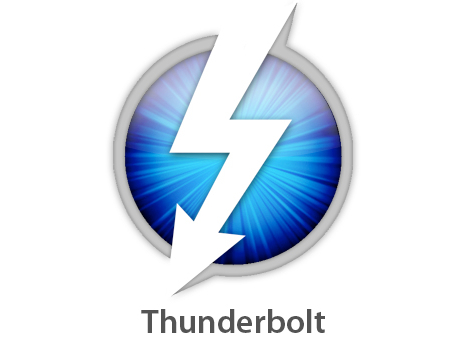Thunderbolt Heading to Windows PCs in 2012
Acer and Asus will release PCs with Thunderbolt technology early next year. Meanwhile, Intel says that copper wiring will be used in the foreseeable near future thanks to the high cost of fiber optics.
Wednesday Intel said that Acer and Asustek Computer will launch Windows-based PCs next year featuring Intel's Thunderbolt high-speed interconnect technology. The company made this revelation at this year's Intel Developer Forum as Mooly Eden, Intel's general manager of the PC client group, demonstrated Thunderbolt in action on a PC during his keynote address.
Since its debut back in February, Thunderbolt has been an exclusively-licensed feature on Apple's Macintosh computers, offering transfer speeds of up to 10 Gbps between compatible devices and their host computers (USB 3.0 offers up to 5 Gbps). However, the demonstration seen on-stage at IDF showed solid state drives connected to a Windows PC and transferring four uncompressed videos at 700 MB/s.
For now, Thunderbolt only supports the PCI Express and DisplayPort protocols. There's also a limited number of compatible peripherals available on the market thanks to Apple's previous exclusivity. That said, Intel stated that it plans to add Thunderbolt support in its chipset for the upcoming Ivy Bridge processors slated to arrive in desktops and laptops early next year. These will be used in Intel's ultrabook design, but currently it's unclear if Ivy Bridge-based models will actually sport Intel's Thunderbolt tech.
As previously reported, Thunderbolt -- which is viewed as an alternative to USB 3.0 -- was originally labeled Light Peak and designed to use fiber optics instead of the current copper wiring. But in order to reduce the cost for manufacturers and consumers, Intel resorted to using the cheaper copper wiring method (which actually works better than originally expected). In fact, Intel has now indicated that copper may be the wiring of choice for the foreseeable near future.
"[Fiber optics is] going to be way out," said Dadi Perlmutter, executive vice president and general manager of the Intel Architecture Group, in an interview at the Intel Developer Forum. "At the end of the day it's all about how much speed people need versus how much they would be willing to pay. Copper will continue to improve, which happens. There have been many technologies that had been predicted dead 20 years ago that are still making good progress. We'll see."
Get Tom's Hardware's best news and in-depth reviews, straight to your inbox.

Kevin Parrish has over a decade of experience as a writer, editor, and product tester. His work focused on computer hardware, networking equipment, smartphones, tablets, gaming consoles, and other internet-connected devices. His work has appeared in Tom's Hardware, Tom's Guide, Maximum PC, Digital Trends, Android Authority, How-To Geek, Lifewire, and others.
-
rozz be awesome to see this technology somehow network PC together. Be nice to be able to transfer files between 2 close proximity machines that quicklyReply -
so let me get this right, Intel may support thunderbolt (their own proprietary format) but not UBS 3.0 (industry standard format) with ivy bridge. I sure hope bulldozer's performance is compelling enough to make Intel reconsider their position on this.....Reply
-
rantoc Now Intel's thunderbolt will flourish when not only 5% of the newly sold computers have support for it, bet they realized their mistake with such minuscule install base that it will never take of for real and rectified the situation!Reply -
Weired comments. I'm pretty sure Intel championed USB as well. They are just moving beyond USB with Thunderbolt. FWIW, even USB 3.0 is S-L-O-W. I have it now and it is still pitifal. I would never use it regularly for hard drive technology. eSATA is still the only way to go there but now with Thunderbolt, you have an interface for all of your hard drives, thumb drives, and any other external tech like monitors, optial drives, cameras, etc. People stuck on USB are like the people who stuck to VESA.Reply
-
burnley14 TBoltGuyWeired comments. I'm pretty sure Intel championed USB as well. They are just moving beyond USB with Thunderbolt. FWIW, even USB 3.0 is S-L-O-W. I have it now and it is still pitifal. I would never use it regularly for hard drive technology. eSATA is still the only way to go there but now with Thunderbolt, you have an interface for all of your hard drives, thumb drives, and any other external tech like monitors, optial drives, cameras, etc. People stuck on USB are like the people who stuck to VESA.Reply
I'm with ya, I don't understand most of the above comments. Intel is pushing a new technology that offers to be amazingly convenient and fast, yet these people are hating on it? Must be because it was adopted by Apple first and the ignorant Apple-mongers that peruse this site so often can't understand anything more complex than "Apple sucks." -
NITROGEnarcosis Any word if this will support TCP/IP like firewire? Would be nice to have a 10gbps link between two systems considering the cost of 10gbps ethernet atm.Reply -
CaedenV I'm stoked about this. It is actually one of the reasons why I have not jumped on upgrading this year. While USB3 is cool and all, it is a very limited application on connecting storage devices to computers.Reply
The original idea behind Lightpeak (thunderbolt is just too lame a name to switch to!) was that it would be one interconnect for all devices, and all protocols. The idea was that you could run ethernet, usb, firewire, eSATA, PCIe, and other popular interconnects through one daisy chain.
In reality it has fallen far short of this, but it is still very fast and has much more potential than USB (1.2GB/s vs 600MB/s). I would absolutely love to have one cable for everything. I hate having a bunch of cables, and then 8 flavor of USB for my devices.
